Charger UltraFire WF-128 or Q-128
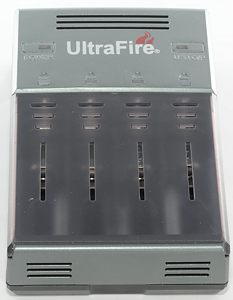

This charger is a LiIon charger mostly for 18650 size batteries. It can also work as a USB charger.
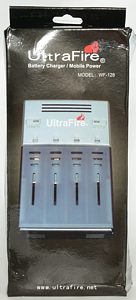
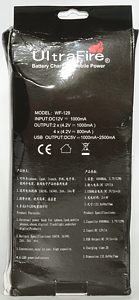
I got the charger from China in an envelope, this was a bit hard on the box, but the charger did surview without any problems.
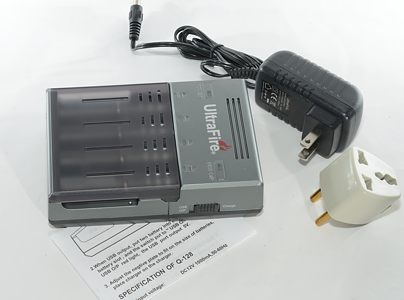
The charger included a universal power supply (100-240VAC 50-60Hz -> 12V 1A) with US connector and an adapter to round pins, but the outside of this adapter is to large for EU use. A specification, operation and warning sheet is also included.
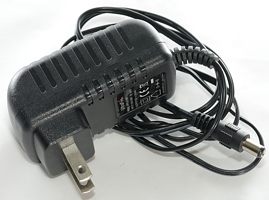
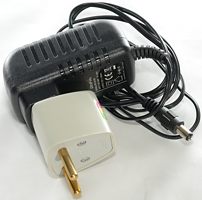
A closer look at the power adapter and the adapter plug.
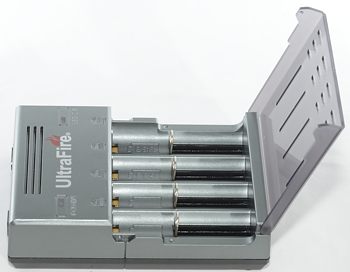
The charger with open cover.

The charger has a red/green led for each channel, a green power led a and a red usb out led.
The battery led is red when charging, green at all other times.

The power in and usb out connector. Do not expect to use 2.5 A at normal USB voltages (about 5 volt).
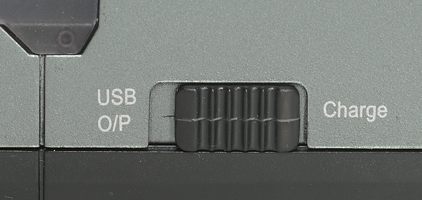
The switch to changes between charge and usb out, the usb out needs two batteries.
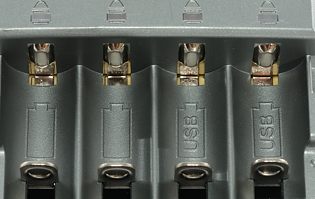
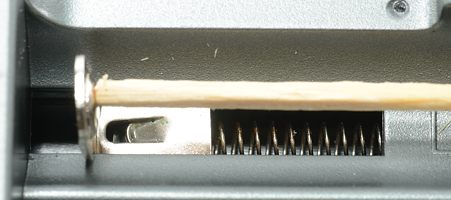
The slider does not work completely smooth, it does sometimes lock up.
It is clearly marked what slots are used for usb out.
Slot #1 & #2 shares a charge circuit, slot #3 & #4 is either used for the second charge circuit or for usb out.

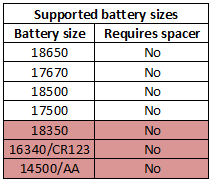
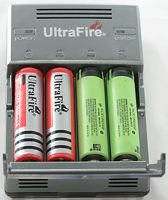
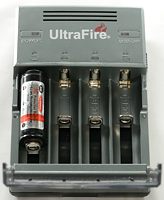
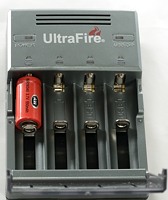
The charger can handle up to 69 mm long batteries, with both flat and button tops cells.
Due to the 0.9A charge current, it is only safe to charge IMR batteries in the 16340/18350/14500 sizes, for larger batteries it is ok to charger both ICR and IMR types.
Measurements
Below 2.5 volt the charger is charging with below 50-100 uA (Led is green).
Between 2.5 volt and 4.2 volt the charger is applying regular charge current (See curve below).
When the battery goes above 4.2 volt the current is turned off (below 20uA current).
The charger will not restart charging before the battery has been removed or power is cycled.
When charger is disconnected from power, but with a battery in, it will draw below 300uA from the battery.
When charging two batteries in channel #1 & #2 or #3 & #4 the charger will only charge 50% of the time on each, i.e. effective charge current is halved.
When one battery is finished, the other will get full time.
Current and voltage will vary slightly between the channels.
.png)
First test is with a protection battery, notice the voltage (red line) at the yellow line, it goes up. This is because the over voltage protection in the battery tripped.
.png)
Next test is with a brand new unprotected battery. This is charged with about 4.28 volt, before termination. This is outside the specifications for most LiIon cells
.png)
My old 16340 IMR cell, the charger goes up to 4.35 volt, this is not very nice.
%20%232.png)
%20%233.png)
%20%234.png)
The 3 other channels, there is not much difference between them.
.png)
A 3400 and a 2600 mAh battery, I am measuring on the 3400. In the first part of the charger curve the current is distributed between the two batteries, when the 2600 mAh battery is full all the current is switched to 3400 mAh battery.
%20%233.png)
Same as above, but in slot #3 & #4, this work exactly as above.
.png)
Same as above, now with batteries in all slots. This looks exactly as above, I.e. slot #1 and #2 does not affect slot #3 & #4.
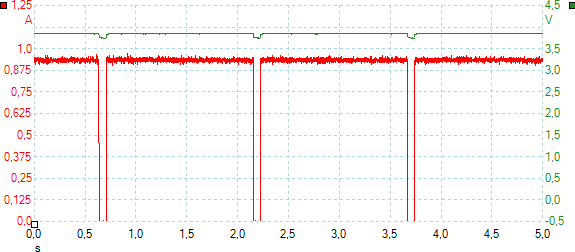
With an oscilloscope the thick current line shows that the charger is pulsing, the periode with the current off is probably used the check the voltage on the battery, i.e. when the battery measures 4.2 volt without current the charger turns off.
This is not the correct way to charge a LiIon battery.
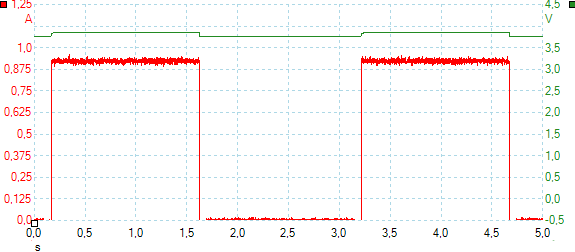
With two batteries only half the time is used to charge each battery.
Measurements on USB power
The charger has a USB out connector that can be switched on with a switch. There must be two batteries in the charger for this to work. According to the specifications the charge can supply up to 2500mA on the USB port.
USB specification says the voltage must be between 4.75 and 5.25 volt for regular USB usage, I have placed a yellow line at 4.75 volt and 5.25 volt in the charts.
When charging at high current (i.e. above 0.5A) the USB voltage are allowed to drop down to 2 volt.
When charging the two batteries are connected in series, i.e. I have a battery voltage of about 8 volt. I only uses one voltmeter in my setup this might give a slightly low battery voltage, this is because I do not subtract the loss there is between the batteries (Switch and wires).
.png)
The first chart is with 250mA load, this gives more than 10 hours runtime, even with only 80% efficiency in the converter.
The circuit does not turn the current off, when the batteries is empty, this must be handled by the battery protection!
.png)
Increasing the current to 500mA, reduces the efficiency a bit, but works fine.
.png)
1A load does also work fine.
.png)
At 1.5A load the circuit cannot keep the voltage up and the efficiency is below 70%.
Conclusion
The charger does not follow the recommended charge procedure for LiIon batteries, but it does charge to 4.2 volt and then turns off or trip the overvoltage protection. This is not the best charge methode, but will work.
The usb output has a nice stable voltage up to about 1A, the efficency is acceptable, but not good.
The charger does what it is supposed to do, but could be better.
Notes
Here is an explanation on how I did the above charge curves: How do I test a charger


















.png)
.png)
.png)
%20%232.png)
%20%233.png)
%20%234.png)
.png)
%20%233.png)
.png)


.png)
.png)
.png)
.png)